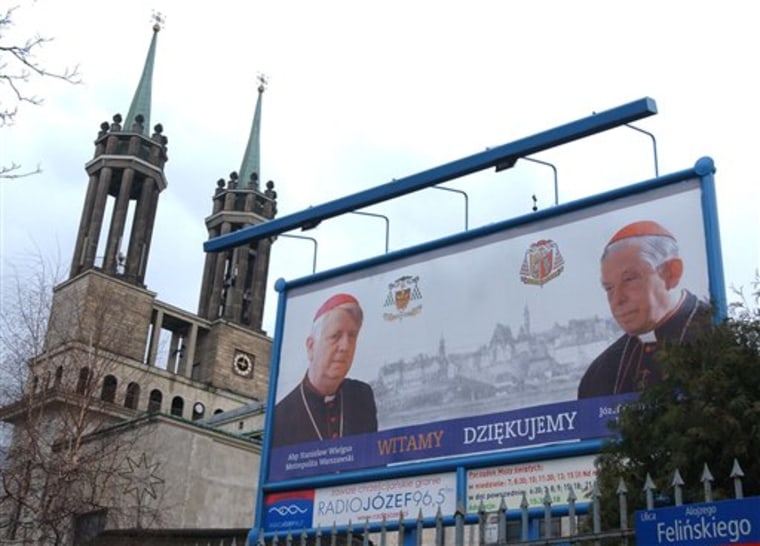Warsaw's new archbishop on Friday admitted he had cooperated with the communist-era secret police, and said he was leaving his fate in the hands of Pope Benedict XVI amid calls for him to step aside ahead of his installation Sunday.
Stanislaw Wielgus expressed regret for an act that he acknowledged "harmed the church." He also said he has informed the pope of this chapter in his life, which he said included a promise to collaborate but never resulted in informing on anyone.
"Before you today, I confess to the mistake committed by me years ago, just as I have confessed to the Holy Father," Wielgus said in an open letter to the country's Roman Catholic clergy and believers.
However, he said, "I never informed on anyone and never tried to hurt anyone."
The mounting allegations against Wielgus, first raised Dec. 20 by a Polish weekly, have gripped heavily Catholic Poland, where the church enjoys high esteem for its opposition to the communist government, and where people revere the late Polish-born Pope John Paul II — credited by some with hastening the regime's fall.
The scandal gained intensity after church officials said Friday that documents at a historical institute indicated Wielgus had willingly collaborated.
Newspapers on Friday devoted their front pages to the revelations, even as Wielgus took canonical vows Friday as required by church law before his installation.
‘Stop the installation’
"Stop the installation," the daily Dziennik wrote in large bold print on its front page, arguing that to allow a "former agent" to hold a top church post would amount to a "moral scandal."
In an earlier statement Friday, Wielgus acknowledged that he did have contact with the secret service, but he said that documents indicating he collaborated were written by the secret police and reflected their account of events, not the truth.
The allegations first surfaced in the right-wing Gazeta Polska weekly, two weeks after the Vatican appointed him archbishop of Warsaw. Wielgus initially denied any collaboration.
Wielgus said he was leaving his fate in the hands of Pope Benedict: "With full humility, I declare to the Holy Father that I will submit to each of his decisions."
Wielgus broke days of silence after two commissions — one state, one church — concluded this week after studying the communist-era archives that he had collaborated with the secret police.
The church commission said Friday it found that "numerous, essential documents exist that confirm Rev. Stanislaw Wielgus' willingness for conscious and secret cooperation with the security organs of Communist Poland."
No proof of harm
The statement added, however, that there is no clear proof that he "inflicted any harm on anyone."
Wielgus is the latest in a series of church and public figures in Poland — homeland of the late Pope John Paul II — to face allegations of collaboration with the secret police before Communist rule ended in 1989.
In his statement, Wielgus acknowledged signing a declaration of cooperation in 1978 when seeking permission to travel to Munich, Germany, because he was threatened by "a very brutal" secret police agent.
"That was my moment of weakness," he wrote, insisting that he never actively cooperated with the secret police.
He also insisted that many facts about him in the documents are wrong, including that he spoke Spanish or had several publications abroad.
"The characterization of me in the secret police material differs so much from the truth, that I would not recognize myself on their basis if it were anonymous," he said.
During a visit to Warsaw in May 2006, Benedict cautioned against passing easy judgment on those who lived in different times — remarks that came in the wake of similar allegations against a Polish priest.
"We must guard against the arrogant claim of setting ourselves up to judge earlier generations who lived in different times and in different circumstances," Benedict told clergy, comments that met with applause.
